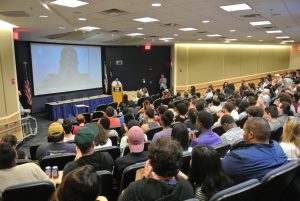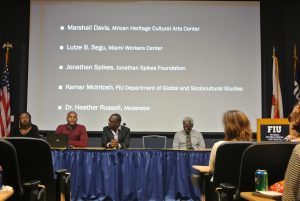This past week FIU hosted a screening and discussion of Barry Jenkin’s Moonlight. Despite having seen it twice already, this viewing was a very different experience from the ones I’ve had in the movie theater. Filling the room to capacity, the crowd here was completely in sync, heavily invested in the film’s exploration of race and sexuality, as well as in its setting that reflected where many of them live and face their own struggles.

It’s rare to see a nuanced approach to intersectionality in an urban setting, seamlessly incorporating subjects like drug abuse and bullying in a focused character study. It’s rare to see a detailed and passionate depiction of the city you live in on the big screen if you don’t live in New York, London or Paris. People certainly reacted to these “rarities”, awing and gasping at Chiron’s (Trevante Rhodes) misfortunes, whispering at the sight of a recognizable landmark in Miami and cheering at Kevin’s (Andre Holland) response to the question “So you Cuban now?” “Only in the kitchen, papi.” There was a feeling of pride and community in the air that matched the film’s palpable love for its characters and its story.

This energy translated into an enthusiastic discussion about the film’s merit and message, but, more importantly, about its effect on today’s world and social climate. Moderated by FIU’s English Department Chairperson Dr. Heather Russell, four inspiring voices representing the black and LGBTQ community contextualized the film’s critical and commercial success and raised important questions about its future and the role of films in addressing social injustice. Marshall Davis recounted how, as the Director of the African Heritage Cultural Arts Center, he has personally seen many young black men turn their life around by channeling their struggles into art, including the actual writer behind Moonlight’s script, Tarell McCraney. Jonathan Spikes, of the Jonathan Spikes foundation, spoke about his sexual abuse as a child and the fight to reclaim his own identity and sexual orientation. Lutze Segu, from the Miami Workers Center, delivered a passionate breakdown of why the film works and why it’s going to be an example for future generations of minorities set on making their voices heard. And last, but not least, Kemar McIntosh, a Phd student for FIU’s African and African Diaspora Studies, reminded us how there are still tons of social issues that need to be addressed, but that Moonlight was proof that they could be thoughtfully and artfully portrayed in film and that there was a public very interested in seeing more projects like these.
 Carlos Paolini is a senior at FIU, pursuing a Bachelors degree in English Literature, a Minor in Sociology and the Certificate for Film Studies.
Carlos Paolini is a senior at FIU, pursuing a Bachelors degree in English Literature, a Minor in Sociology and the Certificate for Film Studies.
